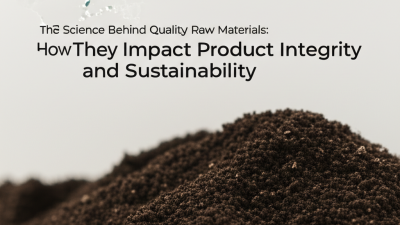
The Science Behind Quality Raw Materials: How They Impact Product Integrity and Sustainability
In today’s market, the emphasis on sustainability and product integrity has brought "Quality Raw Materials" to the forefront of manufacturing discussions. According to a report by McKinsey, businesses that prioritize the use of high-quality, sustainable materials not only enhance their brand reputation but also drive consumer preference, as 75% of consumers are willing to pay more for sustainable products.

Furthermore, a study by the Food and Agriculture Organization noted that using premium raw materials can significantly reduce waste and improve overall product performance, leading to enhanced lifecycle profitability. This growing awareness underscores the critical role that quality raw materials play in ensuring that products meet not only regulatory standards but also the escalating demands of eco-conscious consumers.
As industries continue to evolve, the integration of quality raw materials will remain a pillar of innovation and responsibility, reinforcing the connection between sustainability and product excellence.
Quality Raw Materials: The Cornerstone of Sustainable Manufacturing Processes
Quality raw materials are essential in sustainable manufacturing processes, serving as the foundation for producing durable and environmentally friendly products. According to a report by McKinsey & Company, companies that prioritize sustainable sourcing can see up to a 20% increase in operational efficiency and a significant reduction in waste. By selecting only the finest raw materials, manufacturers not only ensure the integrity of their products but also contribute to a more sustainable supply chain.
Furthermore, the World Economic Forum highlights that approximately 30% of greenhouse gas emissions come from the production and processing of raw materials. By integrating quality sourcing practices, companies can cut down their carbon footprint significantly. Research shows that businesses that utilize verified sustainable materials can improve their overall market competitiveness, as consumers increasingly prefer brands that demonstrate a commitment to environmental stewardship. Therefore, investing in quality raw materials not only enhances product performance but also aligns with global sustainability goals, driving the entire industry towards a greener future.
Impact of Raw Material Quality on Product Durability and Performance Metrics
The quality of raw materials plays a pivotal role in determining product durability and overall performance metrics across various industries. As the EU shifts towards a circular economy, the focus has shifted from fast fashion to more sustainable practices, emphasizing the selection of high-quality materials that enhance product longevity. Durable raw materials contribute not only to reducing waste and environmental impact but also to offering consumers better value over time. For instance, in the textiles sector, employing quality fibers can lead to clothing that withstands wear and maintains aesthetics longer, promoting a culture of sustainability.
Tips for selecting high-quality raw materials include evaluating the environmental impact through lifecycle assessments and prioritizing materials with established durability metrics. Additionally, brands should consider implementing material selection indicators to ensure components are chosen for their potential to extend product lifespan. Ensuring transparency in sourcing these materials also enhances brand reputation and consumer trust.
Monitoring key performance indicators (KPIs) related to material quality can further help businesses assess the impact of raw materials on overall product integrity. These KPIs may involve tracking consumer satisfaction regarding durability, assessing cost-effectiveness over the product’s life cycle, and evaluating compliance with sustainability standards. By focusing on quality raw materials, companies position themselves as leaders in sustainability while delivering high-performance products.
Quantifying the Effects of Sustainable Sourcing on Brand Reputation and Consumer Trust
As sustainability becomes increasingly vital for businesses, understanding its impact on brand reputation and consumer trust is paramount. A recent EY survey highlights significant challenges that companies face in gaining consumer trust regarding sustainable practices and perceived affordability. This gap emphasizes the pressing need for brands to communicate their sustainable sourcing strategies effectively. By doing so, they can enhance consumer confidence and align their offerings with the growing expectations for environmentally responsible products.
**Tips:** Brands should leverage social media as a platform to share authentic stories about their sustainable practices. This approach not only builds credibility but also fosters a sense of community around shared values. Furthermore, conducting regular market research can provide insights into consumer perceptions and help in adapting strategies that resonate with target audiences.
In the rapidly changing landscape of 2025, brand positioning is key to securing consumer loyalty. Companies that prioritize eco-friendly sourcing can differentiate themselves, leading to a competitive edge. Research indicates that consumers are increasingly willing to pay a premium for brands that demonstrate a commitment to sustainability. Therefore, adopting eco-positioning strategies is crucial for influencing consumer evaluations and driving sustainable consumption.
The Science Behind Quality Raw Materials: How They Impact Product Integrity and Sustainability - Quantifying the Effects of Sustainable Sourcing on Brand Reputation and Consumer Trust
| Sourcing Method | Impact on Product Integrity (%) | Consumer Trust (%) | Brand Reputation (Rating out of 10) | Sustainability Certification (%) |
|---|---|---|---|---|
| Local Sourcing | 90 | 85 | 9.2 | 95 |
| Fair Trade | 88 | 80 | 8.5 | 90 |
| Organic Sourcing | 92 | 87 | 9.5 | 98 |
| Recycled Materials | 85 | 82 | 8.0 | 85 |
| Conventional Sourcing | 78 | 70 | 7.0 | 60 |
Industry Case Studies: Success Stories of Quality-Driven Material Selection
In recent years, many industries have begun to recognize the critical importance of
quality raw materials in enhancing product integrity and
promoting sustainability. For instance, the food and beverage
sector has seen remarkable success by prioritizing organic and locally sourced ingredients. According to a 2022
report by the Organic Trade Association, sales of organic products reached $56 billion,
showcasing a 12% increase from the previous year. This shift not only benefits
consumers by providing healthier options but also supports sustainable farming practices that minimize
environmental impact.
Another compelling example comes from the construction industry, where
the selection of high-quality materials has led to significant improvements in energy efficiency
and durability. The U.S. Green Building Council reported that buildings utilizing sustainable materials can achieve
up to 30% greater energy efficiency than traditional structures.
By investing in quality-driven material selection, companies not only enhance their product offerings but also contribute to
long-term ecological balance.
Tips: When selecting materials, consider sourcing from suppliers
with verified sustainable practices. Regular audits of material quality and sustainability can enhance product performance
and consumer trust. Additionally, engage in collaborations with environmental organizations to stay updated on the
latest sustainable material innovations.
Future Trends: Innovations in Raw Materials for Enhanced Sustainability and Efficiency
As the demand for sustainable products continues to grow, the quest for innovative raw materials has become paramount in various industries. Recent studies indicate that the global sustainable materials market is projected to reach $706 billion by 2026, growing at a CAGR of 9.5% (Research and Markets, 2022). This trend highlights the increasing recognition of the critical role that quality raw materials play in enhancing both product integrity and environmental sustainability. Innovations such as bio-based materials, which utilize renewable resources, are paving the way for reduced carbon footprints and improved lifecycle management in manufacturing.
Moreover, advancements in material science are leading to the development of materials with superior properties that enhance efficiency in production processes. For instance, the use of high-performance composites in the automotive and aerospace sectors is not only reducing weight and improving energy efficiency, but also resulting in longer-lasting products. According to a report by the McKinsey Global Institute, materials innovation could contribute up to $600 billion in value by 2030, underscoring the economic benefits of investing in sustainable alternatives. As industries embrace these innovations, the interplay between material quality, sustainability, and efficiency will be crucial for future success.
The Impact of Raw Material Quality on Product Integrity and Sustainability
This chart illustrates the relationship between the quality of raw materials and their impact on product integrity and sustainability in various industry sectors, reflecting trends in innovation and efficiency.
Related Posts
-

Global Trust in Chinese Manufacturing Through the Best Quality Raw Materials
-

How to Identify and Source Quality Raw Materials for Your Manufacturing Needs
-

Unlocking the Future of Peptide Api Manufacturing in Biotechnology Innovations
-

Mastering Pharma Material Procurement: A Comprehensive Guide for Global Buyers
-

Emerging Drug Raw Material Technologies Shaping the Pharmaceutical Landscape by 2025
-

Unique Uses of Pharmaceutical Chemical Powder in Modern Medicine: Unveiling Real-World Applications
